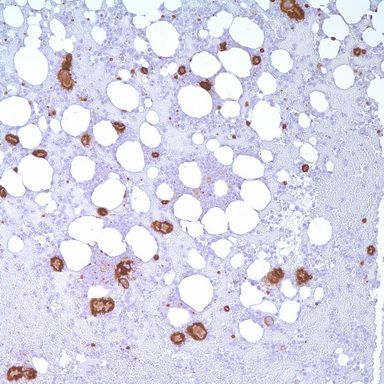CD61 (ITGB3) Mouse Monoclonal Antibody [Clone ID: 2F2]
USD 665.00
USD 200.00
USD 867.00
Specifications
| Product Data | |
| Clone Name | 2F2 |
| Applications | IHC |
| Recommended Dilution | IHC: 1:25 - 1:100 |
| Reactivities | Human |
| Host | Mouse |
| Isotype | IgG1 |
| Clonality | Monoclonal |
| Formulation | This antibody is supplied as cell culture supernatant diluted in tris buffered saline, pH 7.3-7.7, with 1% BSA and <0.1% sodium azide. |
| Conjugation | Unconjugated |
| Storage | Store at -20°C as received. |
| Stability | Stable for 12 months from date of receipt. |
| Gene Name | integrin subunit beta 3 |
| Database Link | |
| Synonyms | BDPLT2; BDPLT16; CD61; GP3A; GPIIIa; GT |
| Note | CD61 is the human integrin beta chain beta 3 protein (ITGB3). Integrins are integral cell-surface proteins composed of an alpha chain and a beta chain. A given chain may combine with multiple partners resulting in different integrins. Integrin beta 3 is found along with the alpha IIb chain in platelets. Integrins are known to participate in cell adhesion as well as cell-surface mediated signaling. The integrin beta 3 chain of the vitronectin receptor and GPIIb/IIIa complex is a 90-110 kDa glycoprotein polypeptide which is expressed on platelets, megakaryocytes, macrophages, osteoclasts, and synovial lining cells. Integrin alpha-IIb/beta-3 recognizes the sequence H-H-L-G-G-G-A-K-Q-A-G-D-V in fibrinogen gamma chain. Following activation, integrin alpha-IIb/beta-3 brings about platelet/platelet interaction through binding of soluble fibrinogen. This step leads to rapid platelet aggregation which physically plugs ruptured endothelial surface. In case of HIV-1 infection, the interaction with extracellular viral Tat protein seems to enhance angiogenesis in Kaposi’s sarcoma lesions.This antibody is useful in evaluating the number of megakaryocytes, size, nuclear lobation, and the presence of obviously abnormal forms and micromegakaryocytes in myelodysplastic syndrome, acute myeloid leukemia with multilineage dysplasia, acute megakaryoblastic leukemia, and myeloproliferative neoplasms. |
| Reference Data | |
| Protein Families | Druggable Genome, ES Cell Differentiation/IPS, Transmembrane |
| Protein Pathways | Arrhythmogenic right ventricular cardiomyopathy (ARVC), Dilated cardiomyopathy, ECM-receptor interaction, Focal adhesion, Hematopoietic cell lineage, Hypertrophic cardiomyopathy (HCM), Regulation of actin cytoskeleton |
Documents
| Product Manuals |
| FAQs |
| SDS |
{0} Product Review(s)
Be the first one to submit a review






























































































































































































































































 Germany
Germany
 Japan
Japan
 United Kingdom
United Kingdom
 China
China



